High School Students’ Perceptions of the Role of Social Support in Cultivating Their Interests in and Aspirations to STEM Degrees and Careers—A Middle Eastern Case Study
Abstract
:1. Introduction
1.1. Review of Literature and Conceptual Framework
1.2. Theoretical Framework
- RQ 1: Do high school students perceive their families, teachers, and society as support or a barrier to cultivating their STEM interests?
- RQ 2: What is the correlation between students’ perceived support from family, teachers, and society and their interest in STEM (if any)?
- RQ 3: How do students’ perceived support from family, teachers, and society influence their likelihood of choosing STEM careers?
2. Materials and Methods
2.1. Study Participants
2.2. Survey Procedure
2.3. Data Analysis
3. Results
3.1. Validation of the Instruments
3.2. Research Findings
3.2.1. RQ1: Do High School Students Perceive Their Families, Teachers, and Society as Support or a Barrier to Cultivating Their STEM Interests?
3.2.2. RQ2: Is There a Correlation between Students’ Perceived Support from Family, Teachers, and Society and Their Interest in STEM?
3.2.3. RQ3: How Do Students’ Perceived Support from Family, Teachers, and Society Influence Their Likelihood of Choosing STEM Careers?
4. Discussion
5. Conclusions
Supplementary Materials
Author Contributions
Funding
Institutional Review Board Statement
Informed Consent Statement
Data Availability Statement
Conflicts of Interest
References
- Ortiz-Revilla, J.; Greca, I.M.; Arriassecq, I. A theoretical framework for integrated STEM education. Sci. Educ. 2022, 31, 383–404. [Google Scholar] [CrossRef]
- Gamage, K.A.; Ekanayake, S.Y.; Dehideniya, S.C. Embedding sustainability in learning and teaching: Lessons learned and moving forward—Approaches in STEM higher education programmes. Educ. Sci. 2022, 12, 225. [Google Scholar] [CrossRef]
- Rashidov, A.S. Using of problem educational technologies in the development of students’creative and logical thinking skills. Berl. Stud. Transnatl. J. Sci. Humanit. 2022, 2, 262–274. Available online: https://berlinstudies.de/index.php/berlinstudies/article/view/372 (accessed on 18 June 2023).
- Lytle, A.; Shin, J.E. Incremental beliefs, STEM efficacy and STEM interest among first-year undergraduate students. J. Sci. Educ. Technol. 2020, 29, 272–281. [Google Scholar] [CrossRef]
- Kayan-Fadlelmula, F.; Sellami, A.; Abdelkader, N.; Umer, S. A systematic review of STEM education research in the GCC countries: Trends, gaps and barriers. Int. J. STEM Educ. 2022, 9, 2. [Google Scholar] [CrossRef]
- Van den Hurk, A.; Meelissen, M.; van Langen, A. Interventions in education to prevent STEM pipeline leakage. Int. J. Sci. Educ. 2019, 41, 150–164. [Google Scholar] [CrossRef]
- Ben Hassen, T. A Transformative State in the Wake of COVID-19: What Is Needed to Enable Innovation, Entrepreneurship, and Education in Qatar? Sustainability 2022, 14, 7953. [Google Scholar] [CrossRef]
- Qatar Ministry of Development Planning and Statistics [Internet]. 2021. Available online: https://www.psa.gov.qa/en/statistics1/pages/topicslisting.aspx?parent=Social&child=Education (accessed on 5 September 2022).
- Ong, A.K.S.; Prasetyo, Y.T.; Pinugu, J.N.J.; Chuenyindee, T.; Chin, J.; Nadlifatin, R. Determining factors influencing students’ future intentions to enroll in chemistry-related courses: Integrating self-determination theory and theory of planned behavior. Int. J. Sci. Educ. 2022, 44, 556–578. [Google Scholar] [CrossRef]
- Sellami, A.; Santhosh, M.; Bhadra, J.; Ahmad, Z. High school students’ STEM interests and career aspirations in Qatar: An exploratory study. Heliyon 2023, 9, e13898. [Google Scholar] [CrossRef]
- Turner, S.L.; Joeng, J.R.; Sims, M.D.; Dade, S.N.; Reid, M.F. SES, gender, and STEM career interests, goals, and actions: A test of SCCT. J. Career Assess. 2019, 27, 134–150. [Google Scholar] [CrossRef]
- Tey, T.C.Y.; Moses, P.; Cheah, P.K. Teacher, parental and friend influences on STEM interest and career choice intention. Issues Educ. Res. 2020, 30, 1558–1575. [Google Scholar]
- Gonzalez, K.; Lynch, K.; Hill, H.C. A Meta-Analysis of the Experimental Evidence Linking Stem Classroom Interventions to Teacher Knowledge, Classroom Instruction, and Student Achievement; Annenberg Institute at Brown University: Providence, RI, USA, 2022; Available online: https://www.edworkingpapers.com/sites/default/files/ai22-515.pdf (accessed on 20 May 2023).
- Ma, L.; Liu, J.; Li, B. The association between teacher-student relationship and academic achievement: The moderating effect of parental involvement. Psychol. Sch. 2022, 59, 281–296. [Google Scholar] [CrossRef]
- Cairns, D.; Areepattamannil, S. Teacher-directed learning approaches and science achievement: Investigating the importance of instructional explanations in australian schools. Res. Sci. Educ. 2022, 52, 1171–1185. [Google Scholar] [CrossRef]
- Zhou, D.; Liu, J.; Ye, G.; Wang, T.; Xia, X.; Liu, J. Relationships among Problematic Smartphone Use, Mathematics Achievement, Teacher–Student Relationships, and Subjective Well-Being: Results from a Large-Scale Survey in China. Behav. Sci. 2022, 12, 454. [Google Scholar] [CrossRef]
- Li, G.; Li, B.; Wang, L.; Liu, C.; Lu, L. A longitudinal study on the impact of parental academic support and expectations on students’ academic achievement: The mediating role of happiness. Eur. J. Psychol. Educ. 2023, 38, 801–818. [Google Scholar] [CrossRef]
- Asanjarani, F.; Aghaei, K.; Fazaeli, T.; Vaezi, A.; Szczygieł, M. A structural equation modeling of the relationships between parenting styles, students’ personality traits, and students’ achievement goal orientation. Front. Psychol. 2022, 12, 805308. [Google Scholar] [CrossRef]
- Morrison, J.; Frost, J.; Gotch, C.; McDuffie, A.R.; Austin, B.; French, B. Teachers’ role in students’ learning at a project-based STEM high school: Implications for teacher education. Int. J. Sci. Math. Educ. 2021, 19, 1103–1123. [Google Scholar] [CrossRef]
- Tao, Y.; Meng, Y.; Gao, Z.; Yang, X. Perceived teacher support, student engagement, and academic achievement: A me-ta-analysis. Educ. Psychol. 2022, 42, 401–420. [Google Scholar] [CrossRef]
- Akram, M. Relationship between Students’ Perceptions of Teacher Effectiveness and Student Achievement at Secondary School Level. Bull. Educ. Res. 2019, 41, 93–108. [Google Scholar]
- Fauth, B.; Decristan, J.; Decker, A.T.; Büttner, G.; Hardy, I.; Klieme, E.; Kunter, M. The effects of teacher competence on student outcomes in elementary science education: The mediating role of teaching quality. Teach. Teach. Educ. 2019, 86, 102882. [Google Scholar] [CrossRef]
- Adu-Boateng, S.; Goodnough, K. Examining A Science Teacher’s Instructional Practices in the Adoption of Inclusive Pedagogy: A Qualitative Case Study. J. Sci. Teach. Educ. 2022, 33, 303–325. [Google Scholar] [CrossRef]
- Ralph, V.R.; Scharlott, L.J.; Schwarz, C.E.; Becker, N.M.; Stowe, R.L. Beyond instructional practices: Characterizing learning environments that support students in explaining chemical phenomena. J. Res. Sci. Teach. 2022, 59, 841–875. [Google Scholar] [CrossRef]
- Li, X.; Bergin, C.; Olsen, A.A. Positive teacher-student relationships may lead to better teaching. Learn. Instr. 2022, 80, 101581. [Google Scholar] [CrossRef]
- Ahmed, F.B.J. Challenges of the knowledge society: Exploring the case of qatar. Glob. Econ. Obs. 2018, 6, 39–54. Available online: https://ibir-api.hbku.edu.qa/sites/default/files/2019-11/Fethi%20challenges.pdf (accessed on 20 June 2023).
- Sellami, A.L.; Al-Rakeb, N.A.; Tok, E. Secondary School Students’ Interest in STEM Careers in Qatar. Educ. Sci. 2023, 13, 369. [Google Scholar] [CrossRef]
- Mustafa, S.A.-A.; Sellami, A.L.; Elmaghraby, E.A.A.; Al-Qassass, H.B. Determinants of college and university choice for high-school students in Qatar. Int. J. High. Educ. 2018, 7, 1–15. [Google Scholar] [CrossRef]
- Ben Hassen, T. The state of the knowledge-based economy in the Arab world: Cases of Qatar and Lebanon. EuroMed J. Bus. 2021, 16, 129–153. [Google Scholar] [CrossRef]
- Lent, R.W.; Brown, S.D.; Hackett, G. Toward a unifying social cognitive theory of career and academic interest, choice, and performance. J. Vocat. Behav. 1994, 45, 79–122. [Google Scholar] [CrossRef]
- Lent, R.W.; Brown, S.D.; Hackett, G. Contextual supports and barriers to career choice: A social cognitive analysis. J. Couns. Psychol. 2000, 47, 36. [Google Scholar] [CrossRef]
- Eccles, J.S.; Adler, T.; Futterman, R.; Goff, S.B.; Kaczala, C.M.; Meece, J.L.; Midgley, C. Expectancies, values, and academic behaviors. Achiev. Achiev. Motiv. 1983, 1983, 75–146. [Google Scholar]
- Fredricks, J.A.; Eccles, J.S. Children’s competence and value beliefs from childhood through adolescence: Growth trajectories in two male-sex-typed domains. Dev. Psychol. 2002, 38, 519. [Google Scholar] [CrossRef]
- Koyunlu Ünlü, Z.; Dökme, İ. Multivariate assessment of middle school students’ interest in STEM career: A profile from Turkey. Res. Sci. Educ. 2020, 50, 1217–1231. [Google Scholar] [CrossRef]
- Blotnicky, K.A.; Franz-Odendaal, T.; French, F.; Joy, P. A study of the correlation between STEM career knowledge, mathematics self-efficacy, career interests, and career activities on the likelihood of pursuing a STEM career among middle school students. Int. J. STEM Educ. 2018, 5, 22. [Google Scholar] [CrossRef]
- Kier, M.W.; Blanchard, M.R.; Osborne, J.W.; Albert, J.L. The development of the STEM career interest survey (STEM-CIS). Res. Sci. Educ. 2014, 44, 461–481. [Google Scholar] [CrossRef]
- Arugay, R. The changing landscape of human resource management in a Qatarization environment: A literature review. JPAIR Multidiscip. Res. 2021, 43, 1–20. [Google Scholar] [CrossRef]
- Hazaimeh, S.A.; Elbanna, S.; Fatima, T. Education and employment reforms toward developing human capital: The case of Qatar. CASE J. 2023, 19, 252–272. [Google Scholar] [CrossRef]
- Parvez, Z. Women workforce participation in Qatar: Oil, culture and demographic trends. In Contemporary Qatar: Examining State and Society; Zweiri, M., Al Qawasmi, F., Eds.; Springer: Singapore, 2021; pp. 231–245. [Google Scholar]
- Luo, L.; Stoeger, H.; Subotnik, R.F. The influences of social agents in completing a STEM degree: An examination of female graduates of selective science high schools. Int. J. STEM Educ. 2022, 9, 7. [Google Scholar] [CrossRef]
- McCoy, S.; Byrne, D.; O’Connor, P. Gender stereotyping in mothers’ and teachers’ perceptions of boys’ and girls’ mathematics performance in Ireland. Oxf. Rev. Educ. 2022, 48, 341–363. [Google Scholar] [CrossRef]
- Balta, N.; Japashov, N.; Mansurova, A.; Tzafilkou, K.; Oliveira, A.W.; Lathrop, R. Middle-and secondary-school students’ STEM career interest and its relationship to gender, grades, and family size in Kazakhstan. Sci. Educ. 2023, 107, 401–426. [Google Scholar] [CrossRef]
- Golkowska, K.U. Arab women in the Gulf and the narrative of change: The case of Qatar. Int. Stud. Interdiscip. Political Cult. J. 2014, 16, 51–64. Available online: https://www.ceeol.com/search/article-detail?id=456854 (accessed on 20 June 2023).
- Sellami, A.; El-Kassem, R.C.; Al-Qassass, H.B.; Al-Rakeb, N.A. A path analysis of student interest in STEM, with specific reference to Qatari students. EURASIA J. Math. Sci. Technol. Educ. 2017, 13, 6045–6067. [Google Scholar] [CrossRef]
- Liloia, A. Gender and nation building in Qatar: Qatari women negotiate modernity. J. Middle East Women’s Stud. 2019, 15, 344–366. [Google Scholar] [CrossRef]
- Ampartzaki, M.; Kalogiannakis, M.; Papadakis, S.; Giannakou, V. Perceptions about STEM and the arts: Teachers’, parents’ professionals’ and artists’ understandings about the role of arts in STEM education. In STEM, Robotics, Mobile Apps in Early Childhood and Primary Education: Technology to Promote Teaching and Learning; Springer Nature Singapore: Singapore, 2022; pp. 601–624. [Google Scholar] [CrossRef]
- Dökme, İ.; Açıksöz, A.; Koyunlu Ünlü, Z. Investigation of STEM fields motivation among female students in science education colleges. Int. J. STEM Educ. 2022, 9, 8. [Google Scholar] [CrossRef]
- Affuso, G.; Zannone, A.; Esposito, C.; Pannone, M.; Miranda, M.C.; De Angelis, G.; Aquilar, S.; Dragone, M.; Bacchini, D. The effects of teacher support, parental monitoring, motivation and self-efficacy on academic performance over time. Eur. J. Psychol. Educ. 2023, 38, 1–23. [Google Scholar] [CrossRef]
- Zhu, Y.; Kaiser, G. Impacts of classroom teaching practices on students’ mathematics learning interest, mathematics self-efficacy and mathematics test achievements: A secondary analysis of Shanghai data from the international video study Global Teaching InSights. ZDM–Math. Educ. 2022, 54, 581–593. [Google Scholar] [CrossRef]
- Cardona, M.C.; Buan, A.T.; Inutan, E.D. Teachers’ Perspective of Science Flexible Learning. Asia Res. Netw. J. Educ. 2022, 2, 1–16. Available online: https://so05.tci-thaijo.org/index.php/arnje/article/view/257219 (accessed on 20 June 2023).
- McLean, L.; Gaul, D.; Penco, R. Perceived social support and stress: A study of 1st year students in Ireland. Int. J. Ment. Health Addict. 2022, 20, 1–21. [Google Scholar] [CrossRef]
- Abd Rahman, N.; Halim, L. STEM Career Interest: The Effect of Gender. Creat. Educ. 2022, 13, 2530–2543. [Google Scholar] [CrossRef]
- Šimunović, M.; Babarović, T. The role of parents’ beliefs in students’ motivation, achievement, and choices in the STEM domain: A review and directions for future research. Soc. Psychol. Educ. 2020, 23, 701–719. [Google Scholar] [CrossRef]
- Starr, C.R.; Ramos Carranza, P.; Simpkins, S.D. Stability and changes in high school students’ STEM career expectations: Variability based on STEM support and parent education. J. Adolesc. 2022, 94, 906–919. [Google Scholar] [CrossRef]
- Cian, H.; Dou, R.; Castro, S.; Palma-D’souza, E.; Martinez, A. Facilitating marginalized youths’ identification with STEM through everyday science talk: The critical role of parental caregivers. Sci. Educ. 2022, 106, 57–87. [Google Scholar] [CrossRef]
- Lee, H.J.; Park, J.Y.; Cho, K.D. Effects of parental attachment on career maturity in university students: Moderating effect of career decision-making self-efficacy and cognitive flexibility. J. Korea Contents Assoc. 2020, 20, 324–335. [Google Scholar] [CrossRef]
- Parola, A.; Marcionetti, J. Career decision-making difficulties and life satisfaction: The role of career-related parental behaviors and career adaptability. J. Career Dev. 2022, 49, 831–845. [Google Scholar] [CrossRef]
- Bentley, B.; Sieben, R.; Unsworth, P. STEM education in Australia: Impediments and solutions in achieving a STEM-ready workforce. Educ. Sci. 2022, 12, 730. [Google Scholar] [CrossRef]
- Waters, C.C.; Orange, A. STEM-driven school culture: Pillars of a transformative STEM approach. J. Pedagog. Res. 2022, 6, 72–90. [Google Scholar] [CrossRef]
- Zafar, M. Career guidance in career planning among Secondary school students. Asian J. Educ. Soc. Stud. 2019, 5, 1–8. [Google Scholar] [CrossRef]
- Sadovets, O.; Martynyuk, O.; Orlovska, O.; Lysak, H.; Korol, S.; Zembytska, M. Gamification in the informal learning space of higher education (in the context of the digital transformation of education). Postmod. Open. 2022, 13, 330–350. [Google Scholar] [CrossRef]
- Grinnell, F.; Dalley, S.; Reisch, J. High school science fair: Ethnicity trends in student participation and experience. PLoS ONE 2022, 17, e0264861. [Google Scholar] [CrossRef]
- Graffin, M.; Sheffield, R.; Koul, R. ‘More than Robots’: Reviewing the Impact of the FIRST® LEGO® League Challenge Robotics Competition on School Students’ STEM Attitudes, Learning, and Twenty-First Century Skill Development. J. STEM Educ. Res. 2022, 5, 322–343. [Google Scholar] [CrossRef]
- Jiang, H.; Zhang, L.; Lv, W. The impact of STEM Competitions on Students’ Career Interest and Persistence in STEM. In Proceedings of the 2022 4th International Conference on Computer Science and Technologies in Education (CSTE), Xi’an, China, 6–8 May 2022; pp. 279–283. [Google Scholar] [CrossRef]
- Maiorca, C.; Roberts, T.; Jackson, C.; Bush, S.; Delaney, A.; Mohr-Schroeder, M.J.; Soledad, S.Y. Informal learning environments and impact on interest in STEM careers. Int. J. Sci. Math. Educ. 2021, 19, 45–64. [Google Scholar] [CrossRef]
- Kitchen, J.A.; Chen, C.; Sonnert, G.; Sadler, P. The Impact of Participating in College-Run STEM Clubs and Programs on Students’ STEM Career Aspirations. Teach. Coll. Rec. 2022, 124, 117–142. [Google Scholar] [CrossRef]
- Fan, S.C.; Yu, K.C.; Lin, K.Y. A framework for implementing an engineering-focused STEM curriculum. Int. J. Sci. Math. Educ. 2021, 19, 1523–1541. [Google Scholar] [CrossRef]
- Han, J.; Kelley, T.; Knowles, J.G. Building a sustainable model of integrated stem education: Investigating secondary school STEM classes after an integrated STEM project. Int. J. Technol. Des. Educ. 2022, 33, 1499–1523. [Google Scholar] [CrossRef] [PubMed]
- Romijn, B.R.; Slot, P.L.; Leseman, P.P. Increasing teachers’ intercultural competences in teacher preparation programs and through professional development: A review. Teach. Teach. Educ. 2021, 98, 103236. [Google Scholar] [CrossRef]
- Sellami, A.; Ammar, M.; Ahmad, Z. Exploring Teachers’ Perceptions of the Barriers to Teaching STEM in High Schools in Qatar. Sustainability 2022, 14, 15192. [Google Scholar] [CrossRef]
- Hamad, S.; Tairab, H.; Wardat, Y.; Rabbani, L.; AlArabi, K.; Yousif, M.; Abu-Al-Aish, A.; Stoica, G. Understanding science teachers’ implementations of integrated STEM: Teacher perceptions and practice. Sustainability 2022, 14, 3594. [Google Scholar] [CrossRef]
- Dou, R.; Cian, H. Constructing STEM identity: An expanded structural model for STEM identity research. J. Res. Sci. Teach. 2022, 59, 458–490. [Google Scholar] [CrossRef]
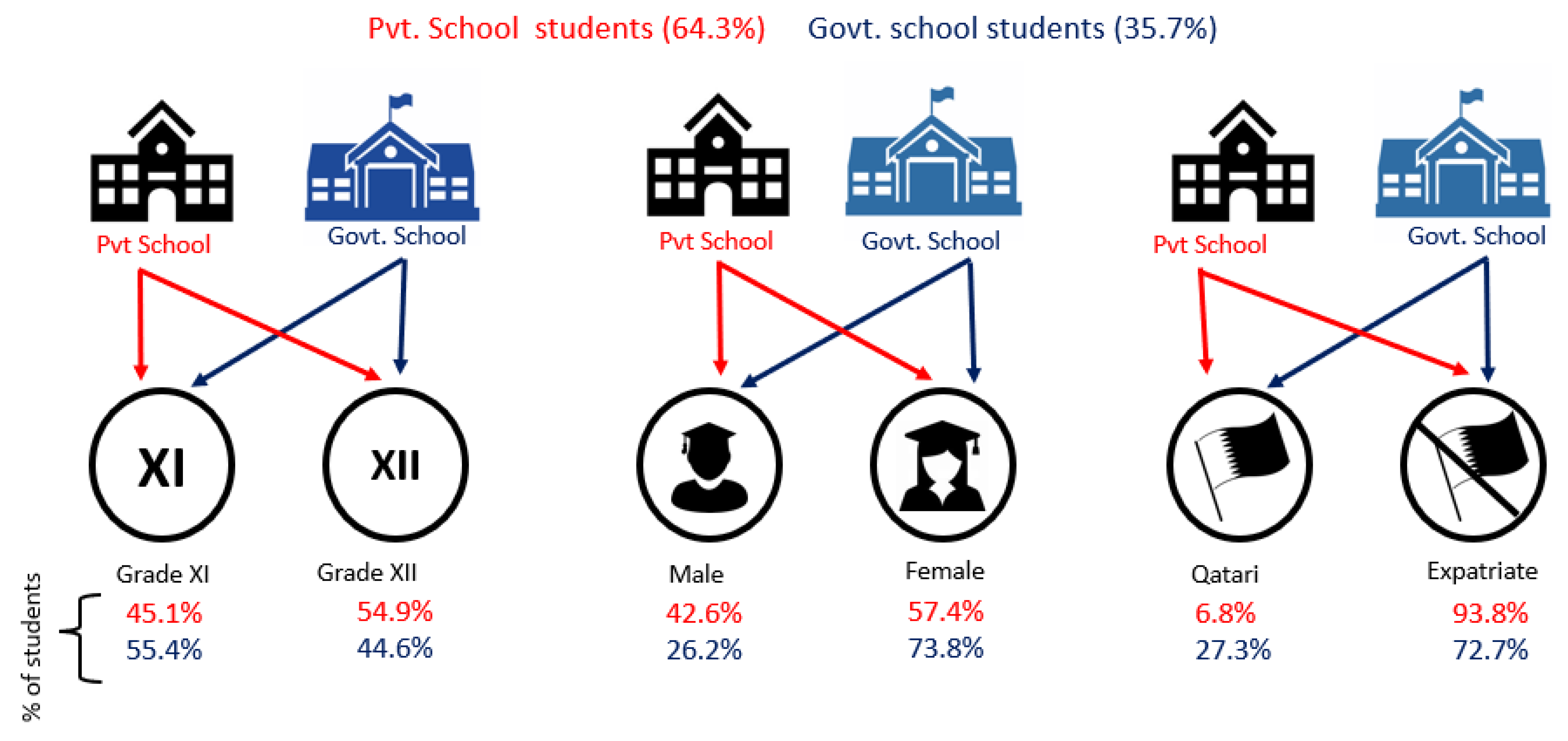
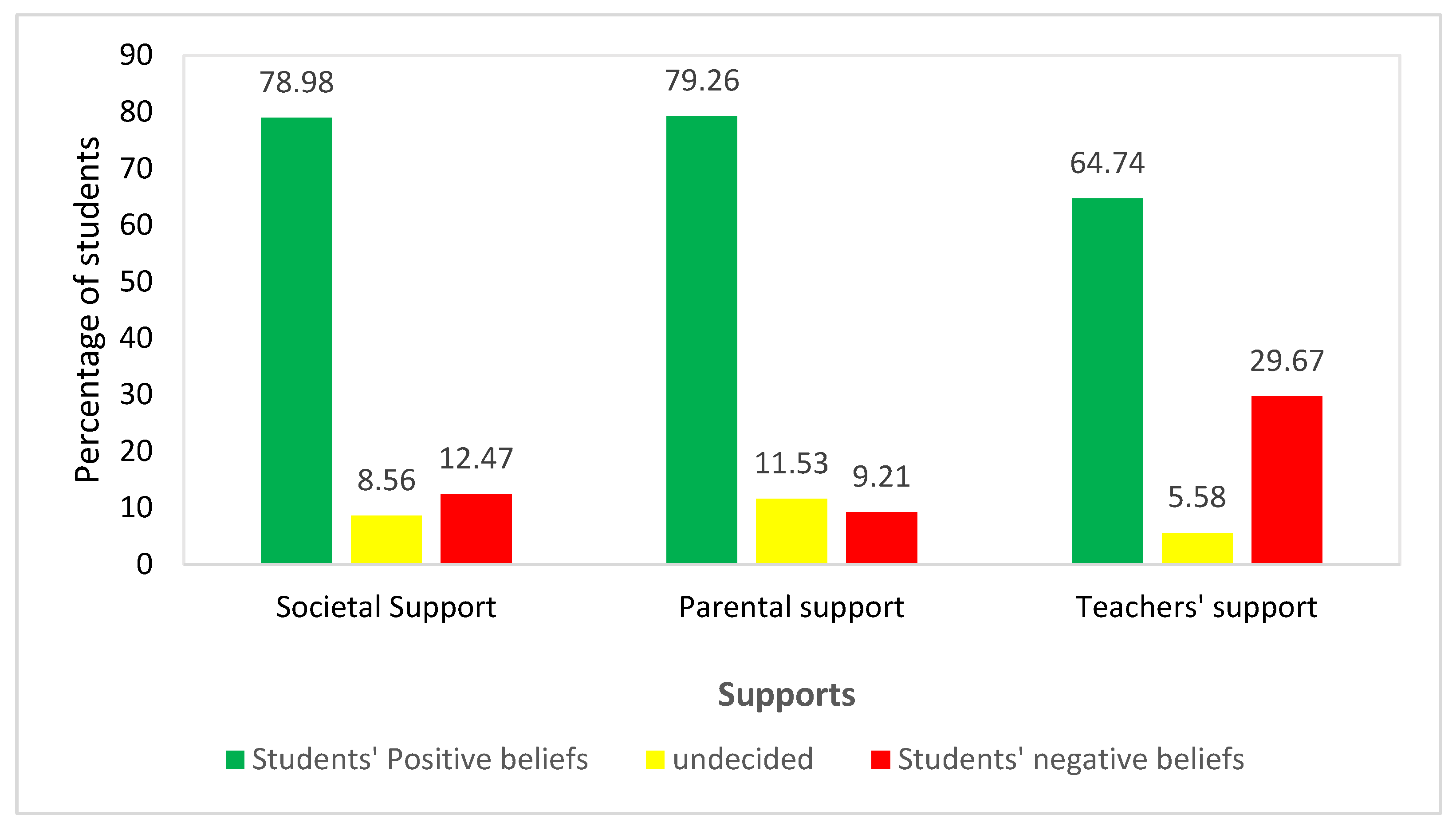
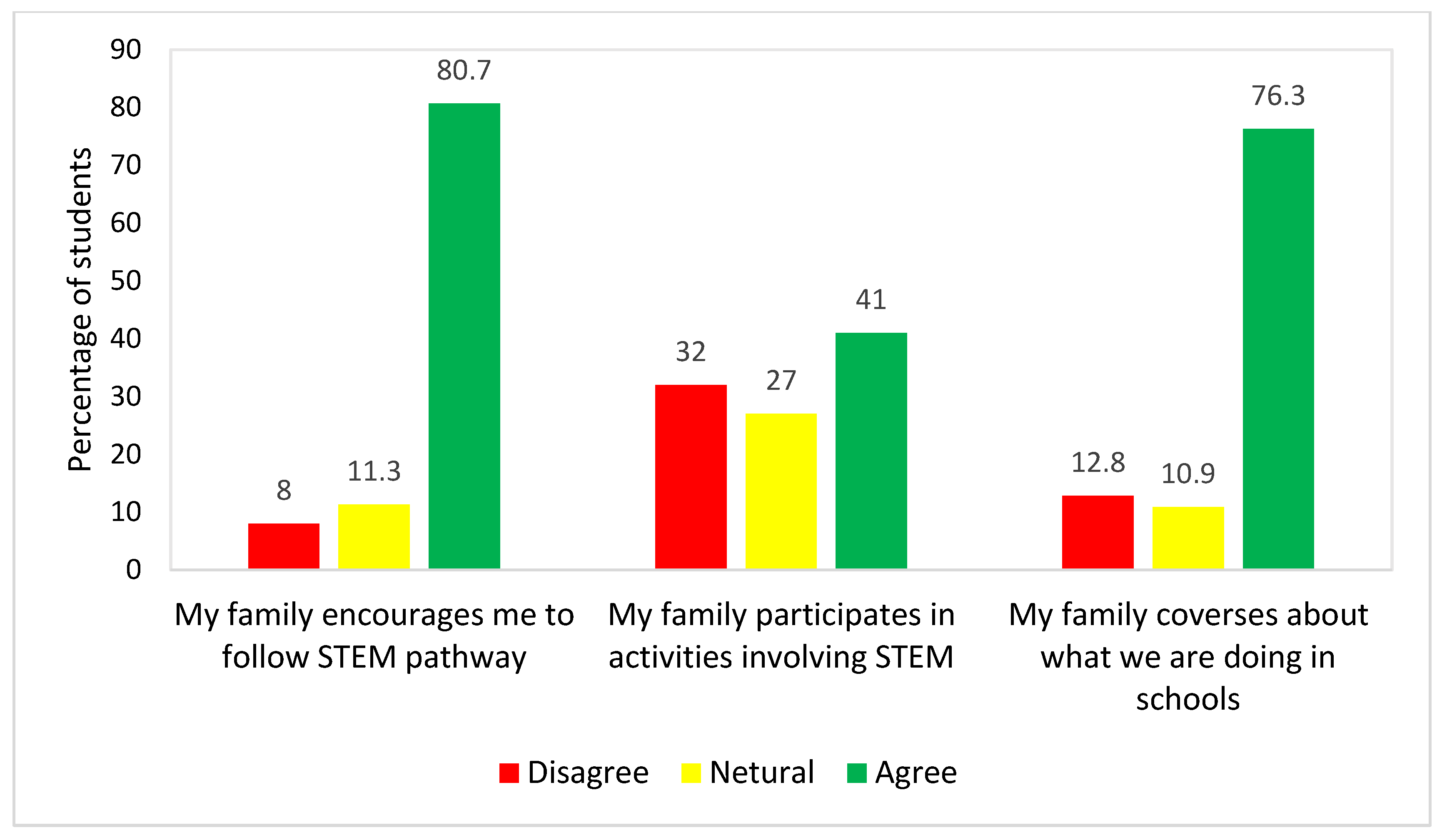
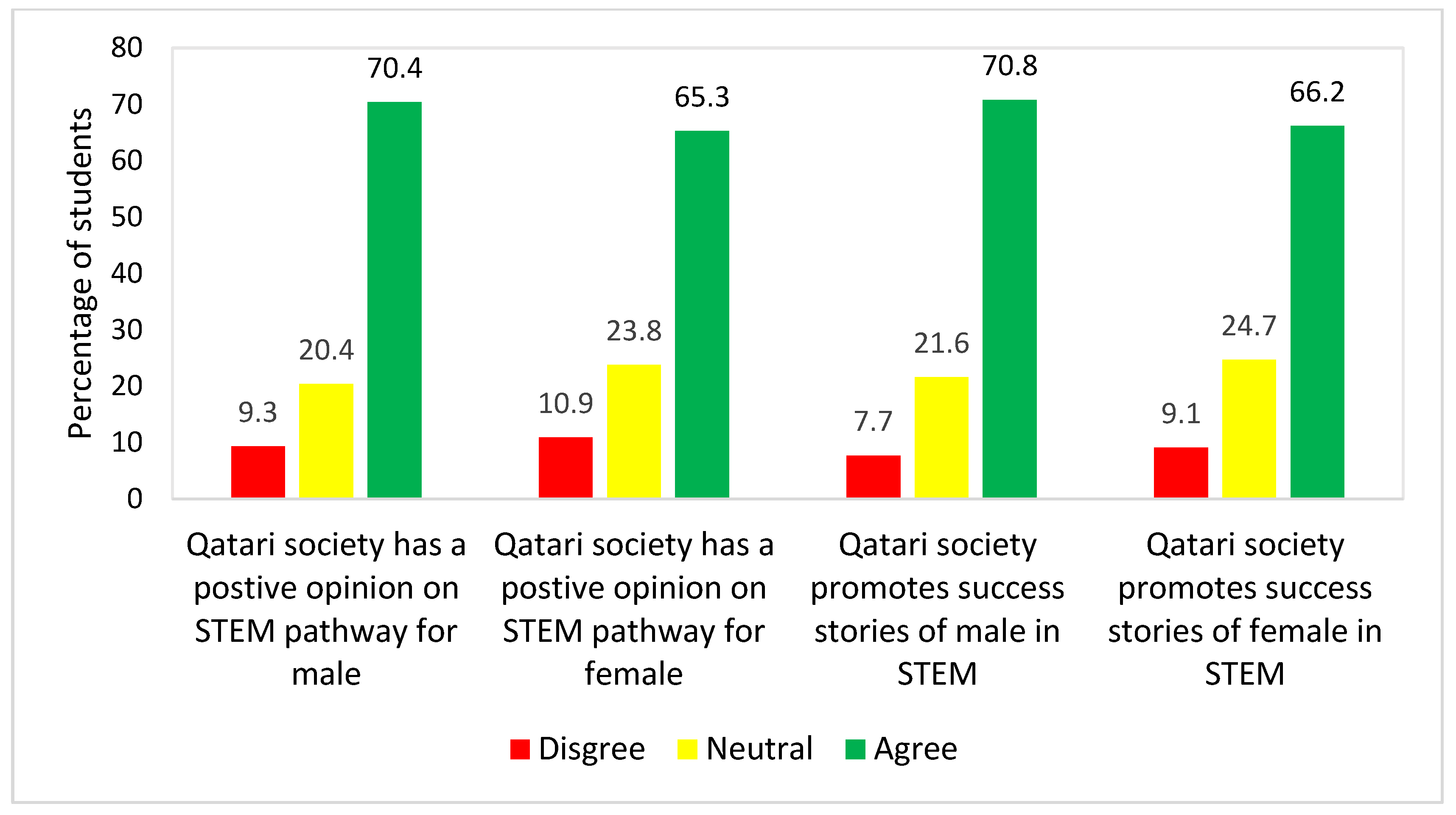
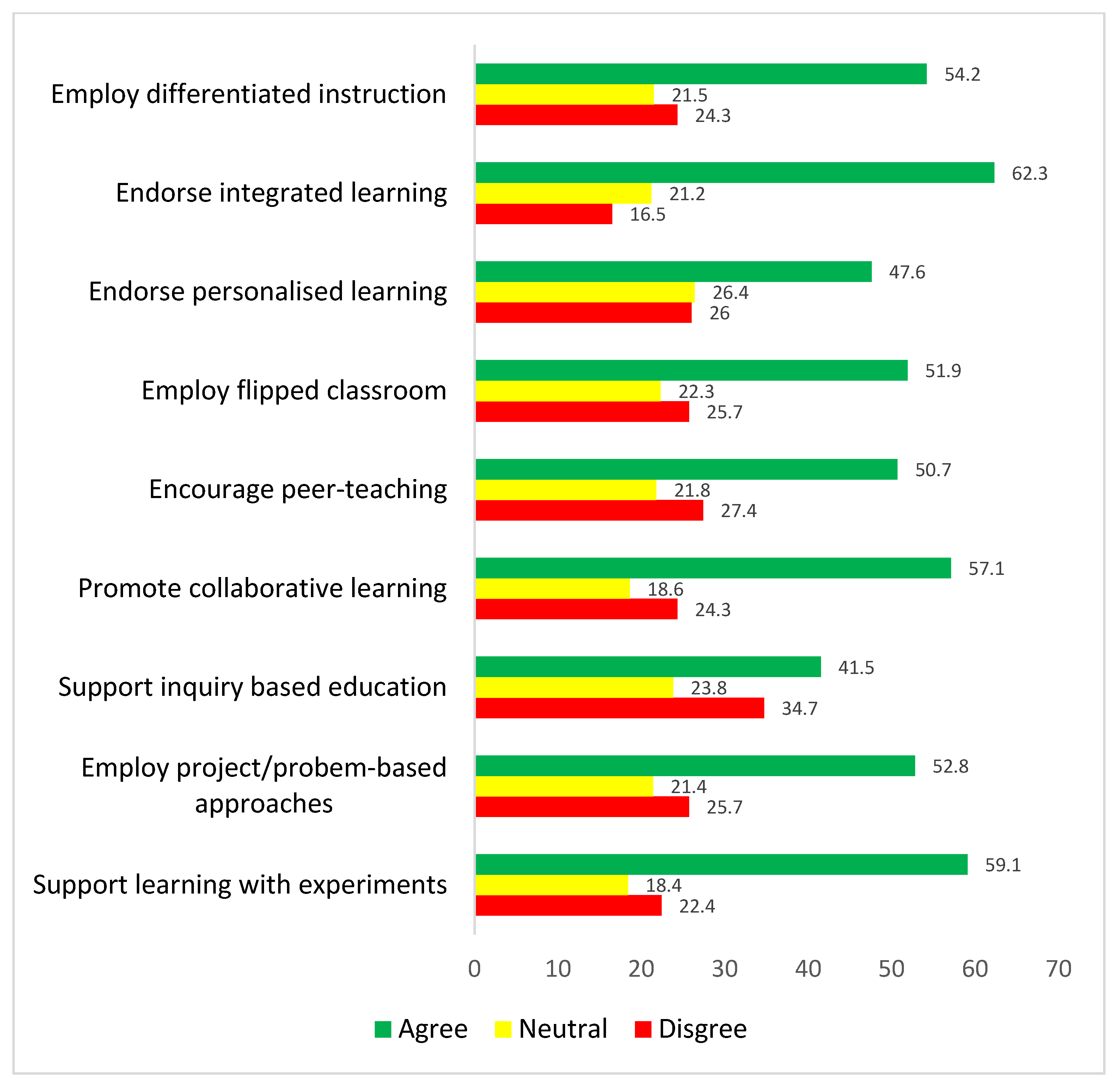
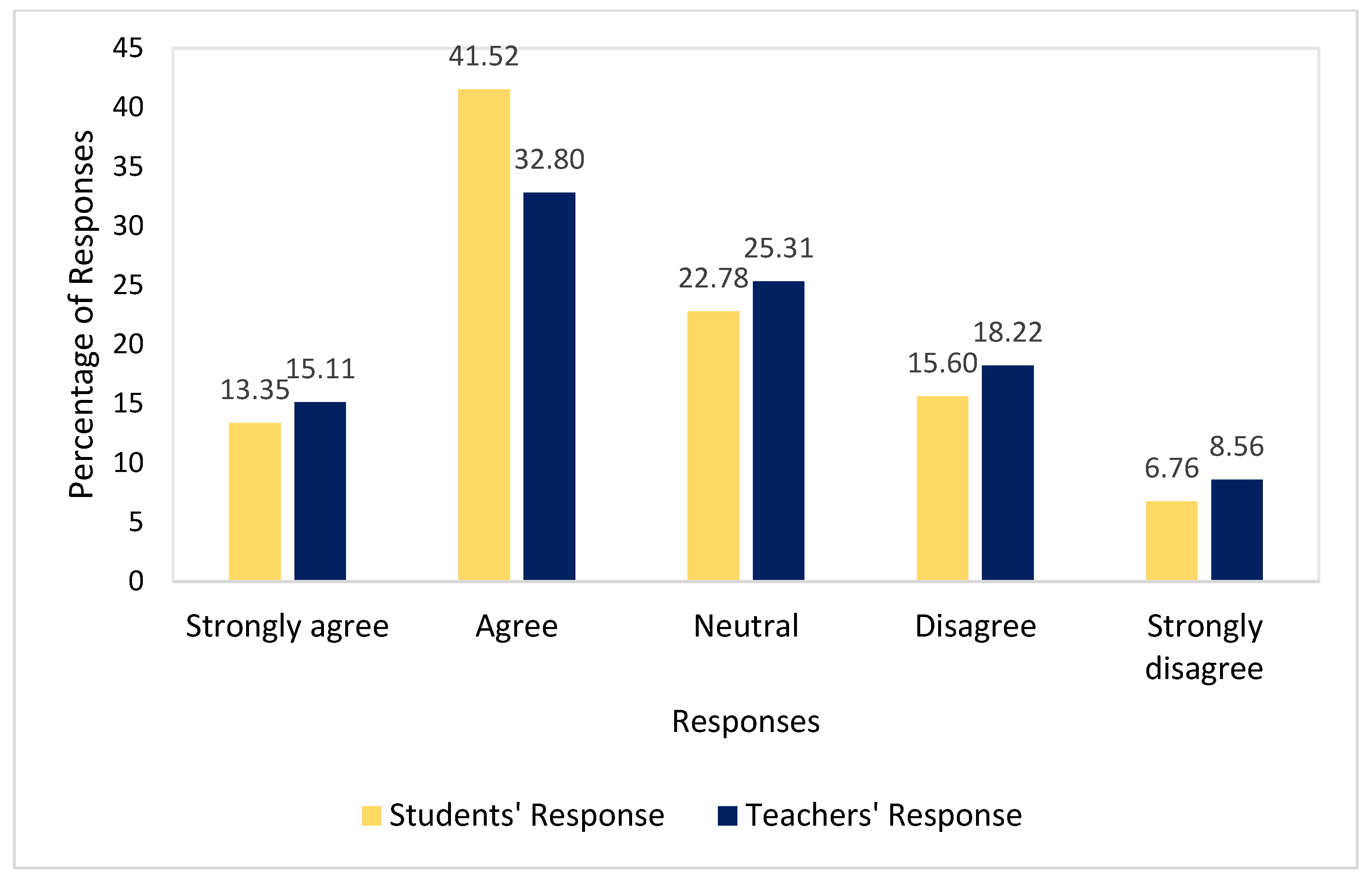
| Type of School | Grade | Gender | Nationality | Number |
|---|---|---|---|---|
| Govt. school (n = 509) | 11th (n = 281) | Male (n = 119) | Qatari | 12 |
| Expatriate | 106 | |||
| Female (n = 161) | Qatari | 70 | ||
| Expatriate | 88 | |||
| 12th (n = 226) | Male (n = 58) | Qatari | 8 | |
| Expatriate | 50 | |||
| Female (n = 168) | Qatari | 47 | ||
| Expatriate | 120 | |||
| Pvt. school (n = 917) | 11th (n = 413) | Male (n = 155) | Qatari | 14 |
| Expatriate | 141 | |||
| Female (n = 257) | Qatari | 12 | ||
| Expatriate | 245 | |||
| 12th (n = 503) | Male (n = 235) | Qatari | 18 | |
| Expatriate | 215 | |||
| Female (n = 268) | Qatari | 13 | ||
| Expatriate | 255 |
| Survey Parts | Constructs | No. of Items | Cronbach’s Alpha | MacDonald’s Omega | Reliability |
|---|---|---|---|---|---|
| Part II | Interest in science | 5 | 0.781 | 0.799 | Reliable |
| Interest in mathematics | 5 | 0.721 | 0.730 | Reliable | |
| Interest in engineering & technology | 5 | 0.844 | 0.856 | Highly reliable | |
| Part III | Role of society | 4 | 0.876 | 0.892 | Highly reliable |
| Role of family | 3 | 0.674 | 0.702 | Reliable | |
| Role of teachers | 9 | 0.971 | 0.945 | Highly reliable |
| Dependent Variable | Independent Variable | Test Statistics | Values | |
|---|---|---|---|---|
| 1 | Support from family | Male | Mean rank | 532.59 |
| Female | Mean rank | 539.22 | ||
| p-value | 0.728 | |||
| 2 | Support from teachers | Male | Mean rank | 507.99 |
| Female | Mean rank | 556.35 | ||
| p-value | 0.012 * | |||
| 3 | Support from society | Male | Mean rank | 509.77 |
| Female | Mean rank | 555.11 | ||
| p-value | 0.017 * |
| Support from Society | Support from Family | Support from Teachers | Interest in Mathematics | Interest in Science | Interest in Engineering & Technology | |
|---|---|---|---|---|---|---|
| Support from society | 1.000 | |||||
| Support from family | 0.361 * | 1.000 | ||||
| Support from teachers | 0.357 * | 0.366 * | 1.000 | |||
| Interest in mathematics | 0.155 * | 0.214 * | 0.083 * | 1.000 | ||
| Interest in science | 0.235 * | 0.296 * | 0.181 * | 0.244 * | 1.000 | |
| Interest in engineering & technology | 0.178 * | 0.215 * | 0.077 * | 0.353 * | 0.095 * | 1.000 |
| Dependent Variable | Independent Variables | B | S.E. | Sig. | Exp(B) | Effect Size |
|---|---|---|---|---|---|---|
| STEM career aspirations | Support from society | 0.021 | 0.023 | 0.378 | 0.980 | 0.113 |
| Support from family | 0.195 | 0.031 | 0.000 * | 0.823 | 0.600 | |
| Supports from teachers | 0.002 | 0.009 | 0.839 | 0.998 | 0.203 |
Disclaimer/Publisher’s Note: The statements, opinions and data contained in all publications are solely those of the individual author(s) and contributor(s) and not of MDPI and/or the editor(s). MDPI and/or the editor(s) disclaim responsibility for any injury to people or property resulting from any ideas, methods, instructions or products referred to in the content. |
© 2023 by the authors. Licensee MDPI, Basel, Switzerland. This article is an open access article distributed under the terms and conditions of the Creative Commons Attribution (CC BY) license (https://creativecommons.org/licenses/by/4.0/).
Share and Cite
Sellami, A.; Santhosh, M.E.; Siby, N.; Bhadra, J.; Ahmad, Z. High School Students’ Perceptions of the Role of Social Support in Cultivating Their Interests in and Aspirations to STEM Degrees and Careers—A Middle Eastern Case Study. Sustainability 2023, 15, 12960. https://doi.org/10.3390/su151712960
Sellami A, Santhosh ME, Siby N, Bhadra J, Ahmad Z. High School Students’ Perceptions of the Role of Social Support in Cultivating Their Interests in and Aspirations to STEM Degrees and Careers—A Middle Eastern Case Study. Sustainability. 2023; 15(17):12960. https://doi.org/10.3390/su151712960
Chicago/Turabian StyleSellami, Abdellatif, Malavika E. Santhosh, Nitha Siby, Jolly Bhadra, and Zubair Ahmad. 2023. "High School Students’ Perceptions of the Role of Social Support in Cultivating Their Interests in and Aspirations to STEM Degrees and Careers—A Middle Eastern Case Study" Sustainability 15, no. 17: 12960. https://doi.org/10.3390/su151712960
APA StyleSellami, A., Santhosh, M. E., Siby, N., Bhadra, J., & Ahmad, Z. (2023). High School Students’ Perceptions of the Role of Social Support in Cultivating Their Interests in and Aspirations to STEM Degrees and Careers—A Middle Eastern Case Study. Sustainability, 15(17), 12960. https://doi.org/10.3390/su151712960






